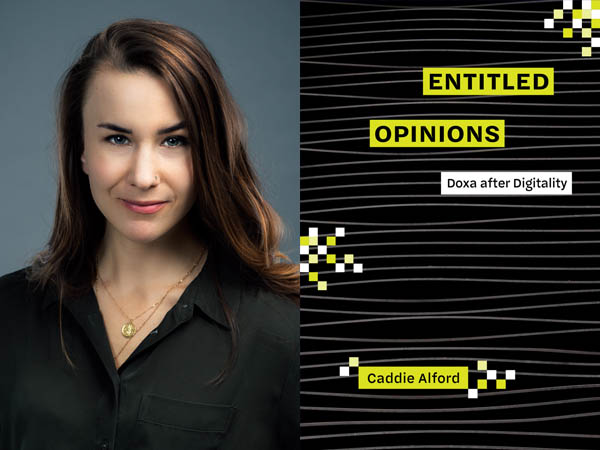Entitled Opinions: Doxa After Digitality
September 23, 2024

Meet VCU Authors: Caddie Alford
Start time: 12:00 p.m.
End time: 1:00 p.m
Location: Virtual
Registration will be available soon.
Entitled Opinions: Doxa After Digitality offers a rhetorical theory of opinions, especially as opinions operate within social media.
Many urgent contemporary issues—from demagoguery to white ethno-nationalism—compel us to consider opinions seriously. Yet while clichés like “he tells it like it is” and newer imperatives such as #BlackLivesMatter seem straightforward, haptics, emoji, and “like” buttons belie unexamined collective assumptions about how opinions in the digital realm function.
Caddie Alford illuminates this function by deploying the ancient Greek term for opinions: doxa. Doxa translates to “opinion,” but the term can also signal seemingness and expectations. Doxa’s capacious meanings reveal opinions to be more than static or monolithic: With doxa, opinions become emergent, dynamic, relational, and pluralistic.
Masterfully combining rhetorical frameworks as well as scholarship on opinions and digital media entanglements, Alford puts opinions into conversation with such case studies as algorithms, infrastructure, digital illiteracy, virality, and activism. She shows how “doxa” reveals gradations of opinions, from more reputable to less reputable. She demonstrates that these gradations are multifaceted and susceptible to interventions.
Entitled Opinions sheds much of the baggage associated with opinions while opening up more fertile pathways of inquiry. In a world that says, “don’t read the comments,” this book reads the comments, taking seriously content that could be easily dismissed otherwise and alchemizing judgments into implications.
About the Author
Caddie Alford, PhD is Assistant Professor of Rhetoric and Writing in the Department of English at Virginia Commonwealth University, and affiliate faculty in the Department of Gender, Sexuality, and Women’s Studies. Her rhetorical studies research interrogates emerging social media forms of persuasion and sociality, such as how the technics of private Facebook groups radicalize publics or how digitality intensifies fascist appeals. Her forthcoming manuscript—Entitled Opinions: Doxa After Digitality (University of Alabama Press “Rhetoric + Digitality” series)—addresses social media rhetorics by creating an affirmative theory of opinions to identify and reclaim a spectrum of truths and their actions, from insular opinions to widely held social facts. Some of her work has appeared in The Quarterly Journal of Speech; Rhetoric Review; and enculturation. She served as the book review editor for the journal enculturation for three years. She is currently co-editing a rhetorical studies collection on “post-truth” rhetorics as they intersect with and inform digitality, politics, epistemologies, health, and so on.